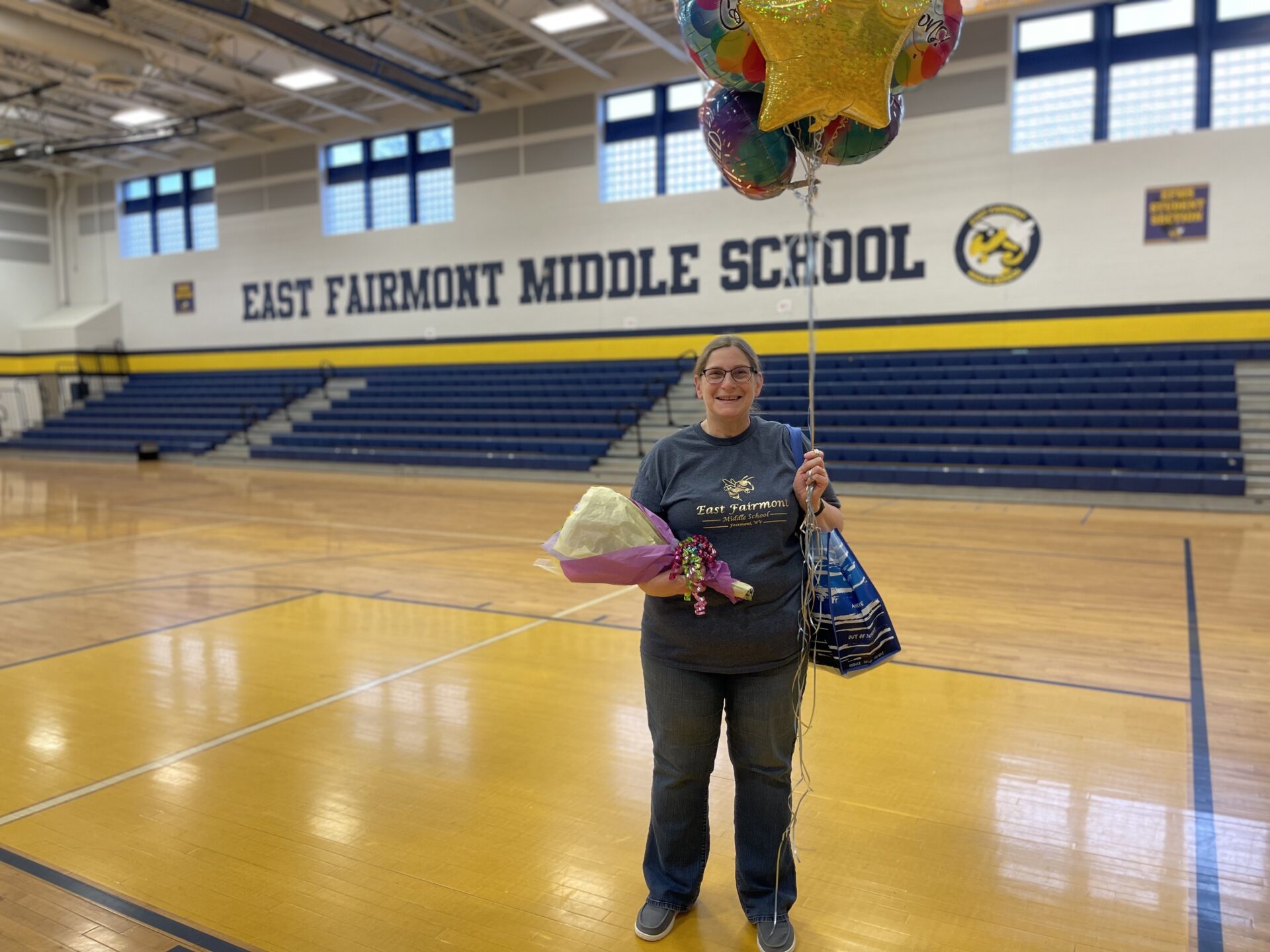Barbara Pill, a science teacher at East Fairmont Middle School (EFMS) in Marion County, earned West Virginia Public Broadcasting’s Above and Beyond Award for February, which recognizes excellence and creativity of Mountain State teachers.
Pill was presented the award by WVPB’s Director of Education Maggie Holley during a surprise school assembly held specially for the occasion. Pill received a monetary award and a signature Blenko Glass blue apple paperweight. The West Virginia State Treasurers’ Office sponsors the award, presenter of the SMART529 college savings program in the Mountain State.
Photo Credit: Autumn Meadows/West Virginia Public Broadcasting
Pill was joined on the floor by longtime friend, colleague, nominator and current principal, Debra Conover. Conover spoke of how Pill goes above and beyond with event preparation, collaborating with NASA, and how she started the STEM program that evolved to what it is today. She said, “It is because of her that the STEM program got started at the old junior high and has carried forward since then. I have lost many rockets with her over the years that we had to go find. But this lady puts in countless hours on Saturday, Sundays, and in the evenings toting things around, making things, sewing things, getting ready for the next event. She started from ordering things for rockets to becoming involved with NASA. From working with their 3D printer, to having her own for students [so they can] program and create their own projects.”
Conover ended with, “My kids have gone through the STEM program. With her guidance and mentoring, older kids from the program have gotten engineering jobs outside of high school and college and are very successful.”
Pill has taught for 15 years and in addition to science classes, she is currently the STEM coach for seventh and eighth grade students. She said she loves teaching about all aspects of science. “Science is so important because it is all around us, so we need to understand and appreciate it. We have those interactions with science without thinking about it from a very young age. A child knows if they throw a ball up it will come down. They will learn how gravity works, but a toddler just knows it does. Science can be so much fun, especially when you understand why things work the way they do. I tell my students I teach science so I can play with the toys!”
She especially enjoys teaching about heredity and DNA. “We make a model of DNA that I designed for students to make using letter beads and the beads to stand for each of the bases. They clip those on their binders and their backpacks, and I have students who have graduated and still have those. It is rewarding to do an assignment that shows how much they enjoyed it.”
In addition to teaching science and being the STEM coach, Pill is also a member of the National Association of Rocketry (NAR) and is the membership chairman for West Virginia Rocketry, the local NAR chapter. With her level two, high powered rocketry certification, her current project is a 7 ½ foot fiberglass rocket.
As the STEM coach, Pill can provide many exciting projects for students such as building rockets, Lego missions and competitions, and 3D printing. She is particularly fond of working on rockets with students while also building and designing her own. “I have rockets that look like medieval battle axes, one that looks like the Cape Hatteras lighthouse as well as more traditional rockets.”
Pill’s first rocket was with the NASA Education Resource Center (ERC) rocketry workshop.
Photo Credit: Autumn Meadows/West Virginia Public Broadcasting
Pill attended several educator workshops through NASA ERC. They train educators to use and teach the kits they provide. These workshops help educators incorporate STEM into their curriculum. Through these workshops, Pill learned about many programs such as the Lego League, the American Rocketry Challenge, the GLOBE project and others that she brought back to the classroom.
This led to East Fairmont Middle School participating in competitions like the TARC finals which involved students designing and building a high-powered rocket to carry a scientific payload. EFMS placed 17th allowing them to participate in the NASA student launch. These accomplishments were recognized by NASA ERC. “Our successful STEM program, particularly our rocketry, earned EFMS STEM an invitation to be guests at the renaming ceremony of the Katherine Johnson IV & V Facility. This was quite exciting to be able to be a part of that moment.”
Each month, WVPB has an esteemed panel of judges that select one deserving teacher who goes above and beyond for the students in West Virginia. If you know of a deserving teacher who goes “Above and Beyond,” please click here to nominate them.
